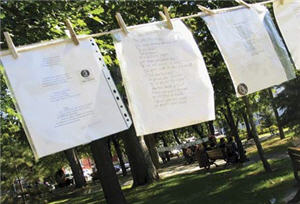GALILEO Resources for National Poetry Month

April is National Poetry Month, and if you’re looking for resources to create a display, host an event, or find some other way to explore poetry or share poetry with others, GALILEO has a few resources that can help.
From the ancients to recent Pulitzer Prize winners, patrons can find poetry criticism, poet biographies, full-text poems, and more in Literary Reference Center. And if you can’t remember what iamb or dactyl means, Literary Reference Center also includes a literary glossary for that.
For a broader search, just type a poet’s name, a type of poetry, or the words, poet* or poetry criticism, into the Discover GALILEO search box to find articles and more.
For institutions that purchase it, Encyclopædia Britannica includes a great article about poetry with links to famous poets. If you’re interested in poetry in other languages, take a look at the foreign language encyclopedias in Global Reference Center.
Find plenty of interesting Georgia poets in the New Georgia Encyclopedia. Click Topics > Arts & Literature > Literature > Poetry to see Georgia poets and journals.
If you work with children and teens, you can find activities and lesson plans in ERIC. Search for “poetry and activity” and limit by grade level in Advanced Search. Check both ERIC@eric.ed.gov and ERIC@EBSCOhost – each may have different items in full text. Professional Development Collection also includes research articles and practical guidance for the teaching of poetry. Just search for poetry study, poetry slams, or a favorite poetry-related term or type of poetry, such as haiku.
Students of all ages (yes, even the grown-ups!) can write a poem about their own hometown and create a digital story to share their personal narratives in the activities outlined by the Where I’m From in GALILEO lesson plan. See the GALILEO site for the lesson plan, poem template, GPS alignments, guides to resources and tools, and an example video and poster.
Some links may not work off site. Log in to GALILEO first for access.